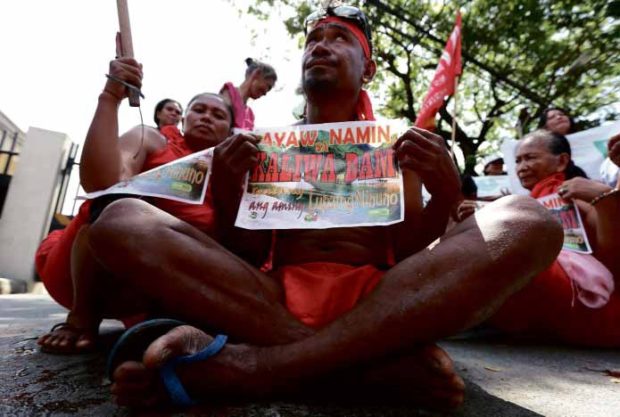Questions over Kaliwa Dam Project: COA cites ‘deficiencies’ in IPs ‘consent’

PROTEST AGAINST DAM This file photo shows members of the Dumagat-Remontado indigenous group holding a protest at the headquarters of the Metropolitan Waterworks and Sewerage System in Quezon City against the proposed KaliwaDam, which is expected to submerge their communities, on April 11, 2019. INQUIRER FILE / NIÑO JESUS ORBETA
MANILA, Philippines — The Commission on Audit (COA) has raised questions over the Metro Manila Sewerage System’s (MWSS) issuance of a notice to proceed (NTP) for the Kaliwa Dam project, including “deficiencies” in some of the requirements related to consent from affected indigenous peoples.
In its 2019 Annual Audit Report on MWSS, COA explained that among the preconditions of the loan agreement for the project is the receipt of the copy of the Environmental Compliance Certificate (ECC).
And among the conditions of the ECC is that no activity shall commence until necessary certifications from the National Commission of Indigenous Peoples (NCIP), including the Certificate of Precondition after the Free and Prior Informed Consent (FPIC) is obtained from the affected indigenous cultural communities (ICCs) or indigenous peoples (IPs).
The FPIC, COA said, “is a specific right that pertains to IPs which allows them to give or withhold consent to a project that may affect them or their territories.”
The IPs’ acceptance of the plan, program, project, or activity—such as the construction of the Kaliwa Dam—shall be stated in a written resolution called the Resolution of Consent or the Resolusyon ng Pagpayag (RP), said COA.
Article continues after this advertisementHowever, COA said an examination of the RP of the Dumagat/Remontado tribe of General Nakar, Quezon revealed several “deficiencies which cast doubts on the validity of the Resolution as well as the acceptability and legitimacy of the signatures gathered.”
Article continues after this advertisementThese deficiencies, COA noted, include the following:
- the RP does not mention the tribal leaders or elders who would recognize or attest to the identity of the IP member who signed the resolution;
- the RP does not bear any date when the purported IPs affixed their signature, which is significant because the date of signing must be within the date of assemblies held or a reasonable period thereafter and not earlier or prior to the date of the execution of the document;
- the Resolution does not state the number of pages that the document contains; there is no attestation at the back of the document or after all the signatures; and that the signatories were properly informed of the legal effects of the resolution;
- the IPs and ICCs (indigenous cultural communities) of Rizal and Quezon Provinces adopted the resolution of consent during the final consensus-building last December 9 and 17, 2019. However, the attached listing of signatures of the RP is dated December 19, 2019;
- the RP was not notarized
“The failure to produce a valid Resolution of Consent and the corresponding MOA renders the consent defective and doubtful. This is without regard to the fact that no RP was submitted for the IPs in the Tanay, Rizal area,” COA said in its report.
Further, COA said the “dubious/questionable character of the consent of the IP members is bolstered” by a Senate hearing conducted in January where several stakeholders and groups from various sectors, including the tribal groups located in the affected areas, were invited.
“Within these groups include residents who argued that they were neither consulted nor informed on the implementation of the project. The same group also claimed that they were disregarded in the dialogues conducted during the community assemblies conducted,” COA said.
“They even questioned the eligibility of the members who signed the RP,” it added.
Thus, COA recommended the MWSS require the FPIC Team to craft a valid and proper RP that complies with the requirements under the NCIP Administrative Order No. 3, series of 2012, and other pertinent laws.
In response, the MWSS said that the FPIC for the Kaliwa Dam Project was hampered by the protest staged by different interest groups, adding that they, together with the NCIP, are in the process of securing the Certification Precondition (CP) through the conduct of two FPICs among IP communities grouped in General Nakar, Quezon and Tanay, Rizal.
Right of way issues
Further, COA noted that “expropriation of lots particularly for the right of way affected by the Kaliwa Dam Project is still pending, hence considered a ground for the termination of the contract.”
Citing Section 17.6 of the Revised Implementing Rules and Regulations of the Republic Act 9184 also known as the Government Procurement Reform Law, COA said: “no bidding and award of contract shall be made unless the detailed engineering investigations, surveys, and designs including the acquisition of the Right of Way for the project have been sufficiently carried out.”
“The pending status of the right of way acquisitions and court proceedings for the expropriation of lots to be utilized for the dam site, treatment plants, tunnel conveyance outlet, access roads, and other permanent structures can adversely affect the duration of the project,” COA said.
In response, MWSS said that the delays in the expropriation proceedings are attributed to the imposition of enhancing community quarantine due to the pandemic.
The explanations of MWSS, however, are still subject to validation, said COA.
The copy of COA’s 2019 Annual Audit Report on MWSS was recently published on the commission’s website.